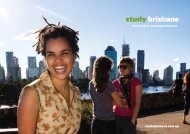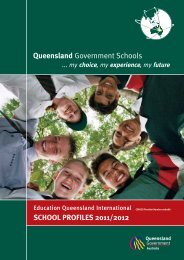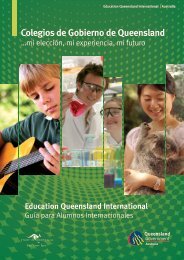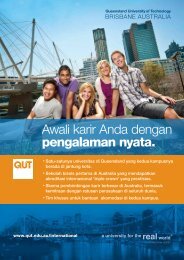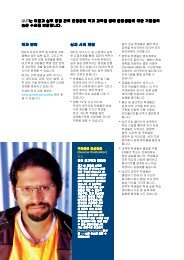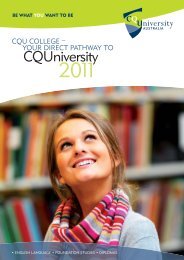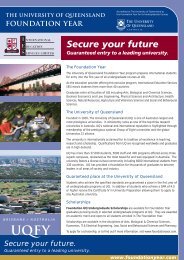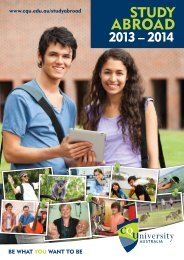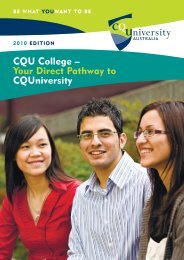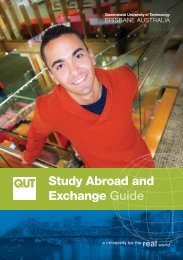UNDERgRADUATE PROSPECTUS - Study Brisbane
UNDERgRADUATE PROSPECTUS - Study Brisbane
UNDERgRADUATE PROSPECTUS - Study Brisbane
- No tags were found...
You also want an ePaper? Increase the reach of your titles
YUMPU automatically turns print PDFs into web optimized ePapers that Google loves.
Career opportunities<br />
Health and physical education teachers; sports<br />
coordinator/coaches; professional coaches/<br />
director of coaching; outdoor educators;<br />
junior science teachers; education officers;<br />
sports administration officers; recreation and<br />
sports development officers; health promotion<br />
officers; corporate health officers in primary<br />
and secondary schools, sporting associations,<br />
universities and colleges, professional<br />
associations (e.g., National Heart Foundation),<br />
health promotion agencies, and private practice.<br />
This program provides an excellent foundation<br />
for postgraduate study in areas such as exercise<br />
science, public health, or sports coaching.<br />
Professional memberships<br />
Graduates of this program are eligible for<br />
membership with the Queensland College of<br />
Teachers. This accreditation is recognised worldwide,<br />
giving you the freedom to work and travel overseas.<br />
Additional cost<br />
– Senior First Aid Certificate (including CPR)<br />
(approximately $155)<br />
International contact details<br />
International Student Advisor<br />
Online: www.uq.edu.au/international/enquiry<br />
Phone: within Australia (free call): 1800 671 980<br />
Outside Australia: +61 3 8676 7004<br />
Bachelor of<br />
Medicine/Surgery<br />
Program code 2046<br />
Location Herston<br />
Commencement semester 1<br />
Duration Six years full-time (undergraduate dual<br />
degree entry); Four years full-time (graduate entry)<br />
Admission requirements Undergraduate dual<br />
degree entry: Year 12 (or equivalent) English (see<br />
page 92) and UMAT or ISAT score<br />
Graduate Entry: grade point average of 5.00 on<br />
a 7-point scale in latest key degree (bachelor,<br />
honours, masters or PhD) and GAMSAT or MCAT<br />
score.<br />
Additional entry requirements Universities Medical<br />
Admissions Test (UMAT), see: www.isat.acer.edu.au<br />
International students can apply via UQ<br />
International, or via ACER.<br />
Graduate Australian Medical Schools Admissions<br />
Test (GAMSAT), see: www.gamsat.acer.edu.au<br />
North American Medical College Admissions Test<br />
(MCAT), see: www.aamc.org/students/mcat<br />
Only complete applications meeting the minimum<br />
entry requirements will be considered for offer.<br />
Applications will not be assessed until all supporting<br />
documentation (original complete academic<br />
transcripts and proof of award; GAMSAT or MCAT<br />
results; UMAT or ISAT results; IELTS if required) has<br />
been received.<br />
USA government legislation requires that USA<br />
citizens or permanent residents seeking USA<br />
government tuition support must sit the MCAT only.<br />
English language proficiency IELTS overall 7,<br />
reading 7, writing 7, speaking 7, listening 7<br />
Honours A modified program of study in Years 3<br />
and 4, with entry based on grade point average<br />
Program outline<br />
This program produces highly skilled doctors capable<br />
of meeting future challenges in a wide variety of<br />
careers. The curriculum has been designed with an<br />
emphasis on problem-based learning and group<br />
work. You will cooperate with other students on a<br />
carefully planned series of patient-centred problems,<br />
each designed to highlight principles and issues<br />
in health and disease. Early patient contact and<br />
clinical training develop high levels of clinical skills<br />
and medical knowledge. The program’s key features<br />
include: simultaneous learning of basic, clinical,<br />
biological and social sciences; improved teaching<br />
of communication skills; use of learning approaches<br />
that encourage lifelong learning skills; incorporation<br />
of ethics and professional development as an integral<br />
part of the program; and incorporation of information<br />
technology and computing skills to ensure that as<br />
a graduate you can use technological advances<br />
to improve your learning skills and knowledge<br />
acquisition.<br />
A new partnership between UQ and the Ochsner<br />
Health System in New Orleans has developed the<br />
UQ-Ocshner MBBS program for approximately 40<br />
USA citizens and USA permanent residents each<br />
year. Note: Subject to approval by the Australian<br />
Medical Council (AMC), see: www.som.uq.edu.au<br />
Placement courses<br />
You must have a Blue Card (Working with Children<br />
Check), issued by the Commission for Children<br />
and Young People and Child Guardian, by the<br />
first day of classes. You must also have a current<br />
Senior First Aid Certificate and provide evidence of<br />
immunisation. See the School of Medicine website:<br />
www.som.uq.edu.au<br />
In Years 3 and 4 of the program, you will<br />
undertake clinical rotations within the School’s<br />
clinical schools (including rural clinical school). You<br />
may opt to complete a clinical rotation overseas.<br />
You must pay for additional costs associated with<br />
attending clinical placements.<br />
Additional information<br />
International applicants are not permitted to defer<br />
offers for this program; however, if you are a<br />
graduate entry applicant you may have your details<br />
kept on file to be reassessed for the following<br />
year’s intake (provided you still meet the entry<br />
requirements, e.g., valid MCAT or GAMSAT score).<br />
School leavers must commence the program in the<br />
year after they finish school.<br />
Career opportunities<br />
Medical practitioner in private practice, public<br />
health, academia/teaching, research, aid<br />
organisations, the defence forces, and/or a<br />
combination of these areas in the fields of<br />
academic medicine; accident and emergency;<br />
anaesthesia; dermatology; general practice;<br />
intensive care; medical administration; medicine<br />
(general medicine, cardiology etc); obstetrics<br />
and gynaecology; occupational medicine;<br />
ophthalmology; paediatrics; pathology/<br />
histopathology/microbiology (haematology);<br />
psychiatry; public health medicine; radiology;<br />
rehabilitation medicine; sexual health;<br />
sports medicine; surgery (general surgery,<br />
neurosurgery etc).<br />
Dual degree programs<br />
– Arts<br />
– Health Sciences<br />
– Science<br />
Additional cost<br />
– Travel and living expenses associated with<br />
placements, some of which may be outside the<br />
<strong>Brisbane</strong> metropolitan area.<br />
– Senior First Aid Certificate (including CPR)<br />
(approximately $155)<br />
International contact details<br />
International Student Advisor<br />
Online: www.uq.edu.au/international/enquiry<br />
Phone: within Australia (free call): 1800 671 980<br />
Outside Australia: +61 3 8676 7004<br />
Bachelor of<br />
Midwifery<br />
Program code 2261<br />
Location Ipswich<br />
Commencement semester 1<br />
Duration Three years full-time<br />
Admission requirements Year 12 or equivalent<br />
English and one of Biological Sciences, Chemistry<br />
or Physics (see page 92)<br />
English language proficiency IELTS overall 7,<br />
reading 7, writing 7, speaking 7, listening 7<br />
Honours Available as an additional year of study<br />
Program outline<br />
As a Bachelor of Midwifery student you will be<br />
based at one of our Clinical Schools and attend<br />
lectures one day a week on campus at UQ. The<br />
program is a three-year, full-time degree, delivered<br />
internally, with an accelerated option to complete<br />
the program in two and a half years. The program<br />
is designed to develop graduate midwives who<br />
will direct their own learning and apply clinical<br />
reasoning skills in their midwifery practice; be able<br />
to work in continuity-of-care models according to<br />
the international definition of the midwife; be able<br />
to work effectively in multidisciplinary teams to<br />
promote quality outcomes of care for each woman<br />
and baby; and provide high quality care through<br />
safe and effective midwifery practice according<br />
to the Australian Nursing and Midwifery Council<br />
(ANMC) and the Australian College of Midwives<br />
Incorporated (ACMI) competency standards.<br />
The program is underpinned by an innovative,<br />
problem-based learning curriculum model that has<br />
been informed by international best practice and<br />
industry experts, and responds to current national and<br />
global population health challenges. In the first two<br />
years of the program, lectures and problem-based<br />
learning are incorporated with clinical experiences<br />
in selected partner teaching hospitals and health<br />
districts. In the final year of the program, you will<br />
undertake extensive preceptored clinical placement,<br />
which will provide you with exposure to an area of<br />
specialty midwifery practice and the opportunity to<br />
consolidate and refine your skills in order to make a<br />
smooth transition to graduate practice.<br />
Additional entry requirements<br />
In order to undertake clinical practice, you must<br />
maintain a current Senior First Aid Certificate through<br />
the duration of the program, with resuscitation recertification<br />
required every 12 months. You must<br />
comply with the School of Nursing and Midwifery<br />
Infectious Diseases and Immunisation Guidelines<br />
and provide serological evidence of your status<br />
with blood-borne transmissible viruses (Hepatitis<br />
B, Hepatitis C and HIV). Carriers of blood-borne<br />
viruses are unable to complete the clinical practice<br />
components of the program and thus will not be<br />
eligible to apply for endorsement as a midwife.<br />
You must also undergo a National Criminal History<br />
Record check (Police Check) and need a current<br />
Blue Card (Working with Children Check) prior to<br />
clinical placement. For further information, contact<br />
the School of Nursing and Midwifery.<br />
Placement courses<br />
Clinical placements commence in the first few weeks<br />
in first year. You will be “buddied” with midwives for<br />
clinical learning throughout the program. Throughout<br />
the program you must complete a set number of<br />
“follow throughs” of women through their pregnancy,<br />
birth and postpartum periods. For the final year of<br />
the program, you must undertake extensive clinical<br />
practice. This may preclude you from undertaking<br />
outside employment during the final two semesters.<br />
Additional information<br />
The Program Rules relating to the Bachelor<br />
of Midwifery degree state that before starting<br />
the program a student must submit a medical<br />
questionnaire. If required, you must attend a<br />
consultation with a medical practitioner acceptable to<br />
54<br />
UNDERGRADUATE <strong>PROSPECTUS</strong> FOR INTERNATIONAL STUDENTS 2012



